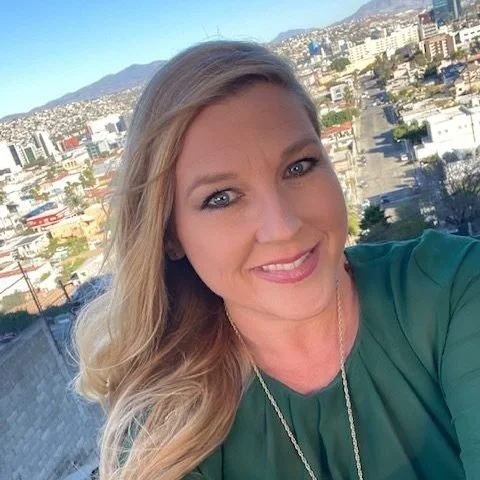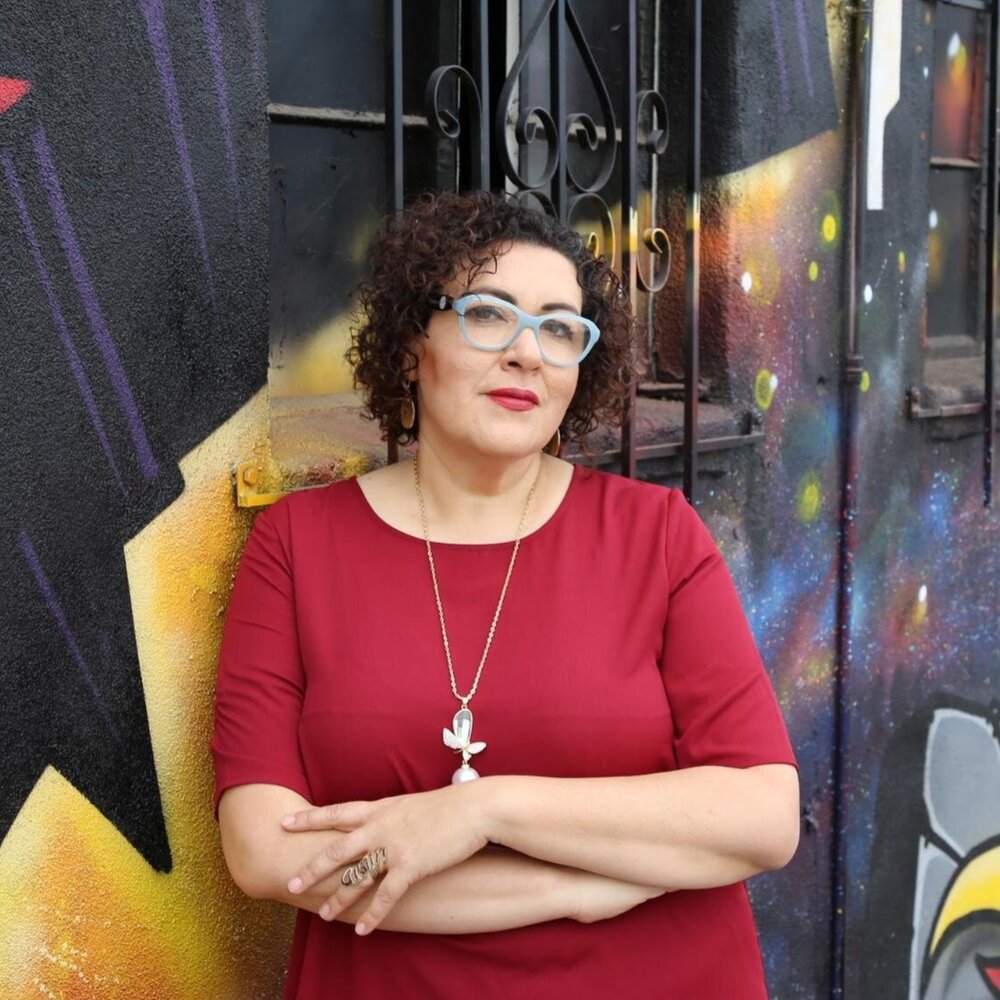A Fresh Cure for Mexico’s Festering Ills?
In March, candidate Claudia Sheinbaum visited the Mexican border city of Ciudad Juarez and from the Monument to Benito Juarez promised voters social programs will continue under her presidency. Photo by Luis Torres/Puente News Collaborative
Borderland Mexicans hope the country’s first female president prevails where her predecessors have not
Editor’s note: This story was co-published with Puente News Collaborative in partnership with palabra by the National Association of Hispanic Journalists. Puente News Collaborative is a bilingual nonprofit newsroom, convener and funder dedicated to high quality, fact-based news and information from the U.S.-Mexico border.
Haga clic aquí para leer el reportaje en español.
CIUDAD JUAREZ – The tortuous path toward a more equal and democratic Mexico was first carved decades ago on the gritty streets of communities bordering the United States.
The denied election wins of mostly conservative politicians in Ciudad Juarez, Matamoros, Tijuana and other border cities started a process that eventually led to prying loose the one-party grip on national power in 2000.
Now, after 24 years of men from alternating political parties holding the presidency, many Mexicans say they’ve not yet found what they seek.
That’s why many voters — like Jesús Ávila, an employee of a small business in Ciudad Juarez, across the Rio Grande from El Paso — believe it’s time to give a woman a chance.
“I have faith that she, the next one, will be the good one,” Avila said, referring to Claudia Sheinbaum, 61, a former Mexico City mayor and acolyte of populist outgoing President Andres Manuel López Obrador.
Rodrigo Pérez, a man living on the streets in Ciudad Juarez, gave a thumbs up at the possibility of candidate Claudia Sheinbaum becoming Mexico's first woman president. He said Sheinbaum is his favorite candidate because of government aid. Photo by Luis Torres/Puente News Collaborative
Sheinbaum, 61, holds about a 20-point advantage over her nearest opponent in a three person race, according to a poll by Puente News Collaborative — an El Paso-based nonprofit news organization. A slew of other polls give her about the same advantage.
Xóchitl Gálvez, also 61, is a self-made tech entrepreneur and conservative politician who grew up poor in a household led by an indigenous father.
Puente’s poll gives Gálvez’s three-party coalition 34% support. A final candidate, Jorge Álvarez Máynez of the center-left Citizens Movement party, has about 12% support.
The Puente poll — conducted by Mexico City’s Buendia & Marquez firm and funded in part by the Center for the U.S. and Mexico at Rice University’s Baker Institute and UC-San Diego’s Center for U.S. Mexican Studies – interviewed 1,000 demographically diverse people. Skewed slightly to areas near the U.S. border, the poll has a margin of error of +/- 3.5%
‘As a border resident having an election in your native country and another in my new homeland is close to madness.’
Before this century, Mexico had never known electoral democracy. Its politics through most of the 20th century were dominated by the Institutional Revolutionary Party, or PRI, a machine that controlled public offices from the presidency to local police commissioners.
This year, Mexico’s national election coincides with the U.S. presidential vote, as it does every dozen.
Manuel Coss, 30, will leave work Friday in El Paso and drive more than 3 hours south to vote in his native Chihuahua City. And then, Coss said, he’ll fret about the U.S. presidential election in November.
Manuel Coss working from his office in El Paso. Photo by Luis Torres/Puente News Collaborative
“As a border resident having an election in your native country and another in my new homeland is close to madness,” Coss said. “On the border we feel the impact from both directions.”
The Puente poll finds that Mexicans favor Joe Biden over Donald Trump as U.S. president, 69 to 11%.
Like many border residents, Coss said he worries about the place that criminal gangs will hold in Mexico’s future.
“We’re on the wrong side of history,” Coss said this week. “Violence is my main concern.”
The most-recent push for democracy began in the early 1980s and resulted in denied victories in Chihuahua, bordering West Texas and New Mexico, and in Tamaulipas, which hugs Southeast Texas and and the Gulf of Mexico.
In 1988, the PRI-held federal government was forced to abort a vote count that many believed would have given the presidency to leftist Cuauhtémoc Cárdenas. The PRI’s Carlos Salinas de Gortari was declared the winner, and soon negotiated a free trade deal with the United States and Canada that has industrialized northern Mexico.
Mexican President Carlos Salinas, back left, President George Bush, center, and Canadian Prime Minister Brian Mulroney, right, participate in the initialing ceremony of the North American Free Trade Agreement (NAFTA) in San Antonio, Texas. Photo by David Valdez/National Archives and Records Administration
The PRI won the presidency again in 1994, by a slight margin, but its power then quickly eroded as democracy forces accelerated. Later that decade, Cárdenas captured Mexico City’s mayorship and opposition parties gained a combined majority in the national congress.
Vicente Fox, a business executive from Gálvez’s National Action Party, won the presidency in 2000, followed in another disputed vote in 2006 by National Action’s Felipe Calderón. AMLO lost that race by less than half a percent of the vote.
Today, a once imperial-presidency is curbed by fragmented political power and a press comparatively freer than in the days of the PRI’s absolute control. However, Mexico remains a dangerous, often deadly, country for journalists due to the spread of narco violence and political corruption.
But his many critics contend that López Obrador has been trying to gut institutions painfully built through 30 years meant to guarantee free and fair elections as well as checks and balances of divided government.
‘Just a few years ago it was almost impossible to think a woman could win the presidency.’
“López Obrador has already distorted the country’s political system to tilt the electoral playing field in his party’s favor,” political analyst Denise Dresser writes in the U.S. publication Foreign Affairs. “He has shown himself willing to sacrifice anything in order to win, including democracy itself.”
Perla Olivares, a low wage factory worker in Ciudad Juarez, said she has yet to see significant political improvement.
“I remember as a child walking with my parents demanding change,” Olivares said in a recent interview. “My parents are gone. But that Mexico they wanted never came.”
In Tijuana, on the California border near San Diego, Sandra López, 50, said she always votes for the PRI, despite frequent disappointment. She’s now hoping that either Sheinbaum as president might prove more adept than the male leaders of the past.
Morena candidate Claudia Sheinbaum speaks to supporters at the capital's main public square during the mandated end of her campaign. According to the Puente survey, Sheinbaum leads with up to 54% of the Mexican vote. Photo by Omar Ornelas/El Paso Times
"Sometimes a woman thinks better than a man," she laughed.
Marco Arreortua, 52, a Mexican journalist now living in Phoenix, Arizona worries about Mexico’s future but believes electing a female president matters a lot. He plans to travel to Mexico to witness the moment.
“For me it’s very significant and will mark Mexico’s political history,” said Arreortua, who will vote online. “Just a few years ago it was almost impossible to think a woman could win the presidency.”
Others doubt that gender-bending politics will lead to much difference.
“Unfortunately, they’re won over by the money, the good position,” said Josefina Gonzales, 52, a Ciudad Juarez grandmother who earns a scant living cleaning houses. “While they reach the highest levels, the poor stay at the bottom.”
Alfredo Corchado is the executive editor for Puente News Collaborative and the former Mexico/Border Correspondent for The Dallas Morning News. He’s the author of “Midnight in Mexico” and “Homelands.” @ajcorchado
Other palabra articles by Alfredo Corchado: In Mexico’s Historic Vote, Politics are Little Changed, Con voto histórico en México, la política cambiaría poco, Words To Live By
Angela Kocherga, an award-winning journalist and news director of the public radio in El Paso, and NPR contributor for regional and national stories about the border. She’s also a co-host for the Texas Standard statewide daily news program. @AngelaKBorder
Other palabra articles by Angela Kocherga: In Mexico’s Historic Vote, Politics are Little Changed, Con voto histórico en México, la política cambiaría poco, El Paso Remembered
Wendy Fry from CalMatters covers inequality, immigration, reparations, and issues affecting families in the Cali-Baja region. She has covered Tijuana, Baja California, and the border since 2009. @WendyFry_
Beatriz Limón is a freelance journalist with extensive experience in the field of communications. During her career, she was a correspondent in Arizona and New York for the international news agency EFE, as well as for The Arizona Republic, where she contributed to the Latino publication La Voz. She earned a B.A. in communication sciences from the Universidad Autónoma de Baja California and a master’s in history. She has received fellowships from the Solutions Journalism Network and has contributed articles for the SJN Labor Cohort. She is currently a Education Writers Association fellowship working on a series of articles on the topic: “The worrisome mental health situation among Latino students in Arizona.” In addition to her journalistic work, she is an accomplished professional photographer and a columnist for the newspaper El Imparcial. Additionally, she actively contributes to outlets such as Arizona Luminaria, palabra and Conecta Arizona. @BetyLimon16
Other palabra articles by Beatriz Limón: Arizona Students Struggling in Silence, Estudiantes en Arizona luchando en silencio, “El largo viaje de Carlos Guerrero”, Children Drawing Deportation, Dibujar la Deportación, Seen. Heard., Vista y escuchada, The Mexican Option
Dudley Althaus has reported on Mexico, Latin America and beyond for more than three decades as a staff newspaper correspondent. Beginning his career at a small newspaper on the Texas-Mexico border, Althaus had an award-winning 22-year stint as Mexico City bureau chief of the Houston Chronicle. After a four-year run as a Mexico correspondent for The Wall Street Journal, Althaus covered immigration and border issues as a freelancer based in San Antonio for Hearst Newspapers. He has covered every Mexican presidential election since 1988, when Mexico's troubled transition to democracy began. @dqalthaus
Other palabra articles edited by Dudley Althaus: In Mexico’s Historic Vote, Politics are Little Changed, Con voto histórico en México, la política cambiaría poco















